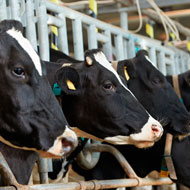
New study finds culling is unlikely to be the most successful control strategy
Regular TB testing is a more effective control strategy than badger culling, suggests new research by the Queen Mary University of London (QMUL).
Using state-of-the-art computer modelling, the research team looked at how different factors impact infection rates.
In a region with 1.5 million cows, 3,000 to 15,000 of which may have had TB, badger culling reduced the number of infected cows by 12. Reducing the testing interval by one month, however, caused the number to drop by 193.
According to the findings, regular testing of cattle could eventually eradicate TB, with or without badger culling. In the computer model, badger culling alone did not eradicate the disease.
"Our modelling provides compelling evidence, for those charged with controlling bovine TB, that investment in increasing the frequency of cattle testing is a far more effective strategy than badger culling," said Professor Matthew Evans, professor of ecology at QMUL.
Researchers also found that housing cattle in large sheds during winter could double the number of infected cows, greatly increasing the chance of TB being passed from animal to animal.
Professor Evans added: "Of the available bovine tuberculosis control strategies we believe that how frequently cattle are tested and whether or not farms utilise winter housing have the most significant effect on the number of infected cattle.
"TB is a complex disease and modelling it is difficult but we’ve successfully used our model to replicate real world situations and are confident that it can be used to predict the effects of various changes in the way we tackle the disease."
The large-scale model is the first of its kind to study the possibility of infection being passed in both directions between cattle and badgers. It mimics the patterns of TB spread in the UK, including changes after TB controls were reduced during the foot and mouth epidemic in 2002.
Factors taken into consideration were: how cattle are moved and housed, how frequently they are tested, different types of badger culling and the movement and life-cycles of both species.
The paper has been published online in the Stochastic Environmental Research and Risk Assessment.



 The Veterinary Medicines Directorate (VMD) is inviting applications from veterinary students to attend a one-week extramural studies (EMS) placement in July 2026.
The Veterinary Medicines Directorate (VMD) is inviting applications from veterinary students to attend a one-week extramural studies (EMS) placement in July 2026.